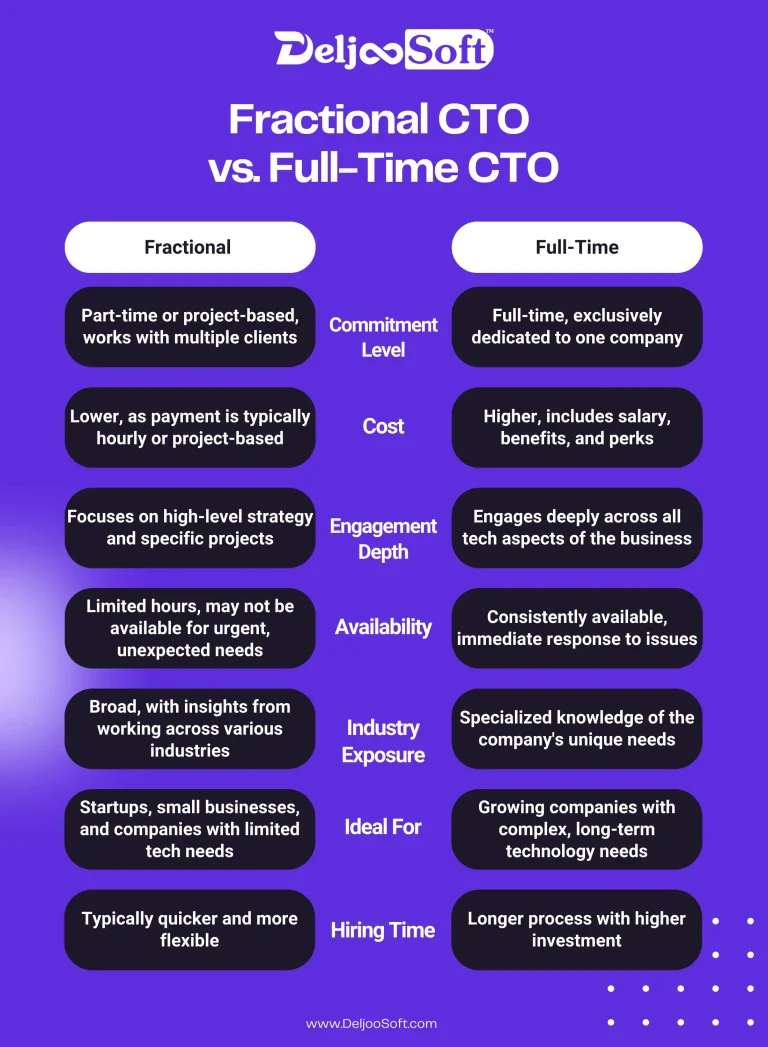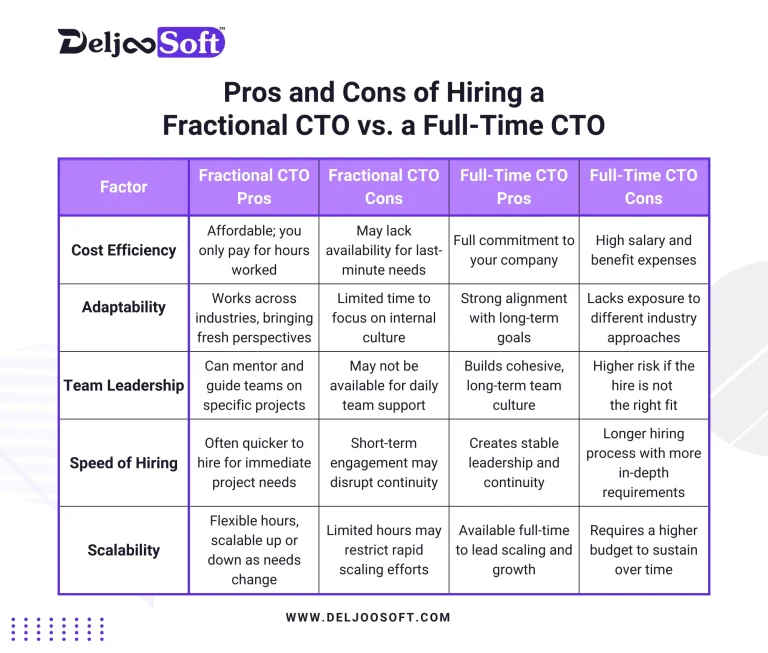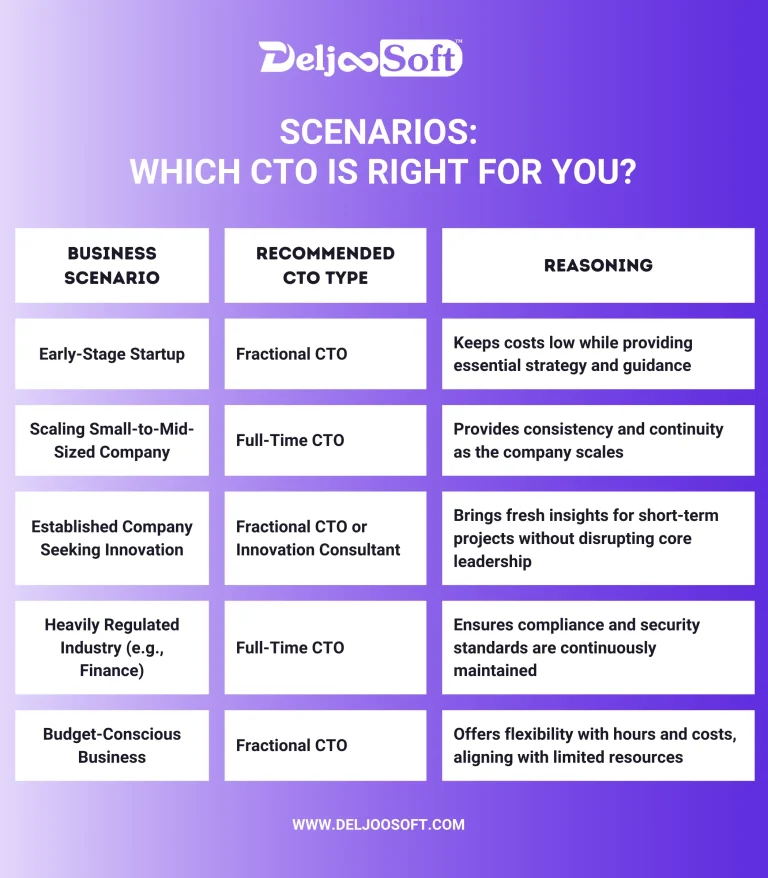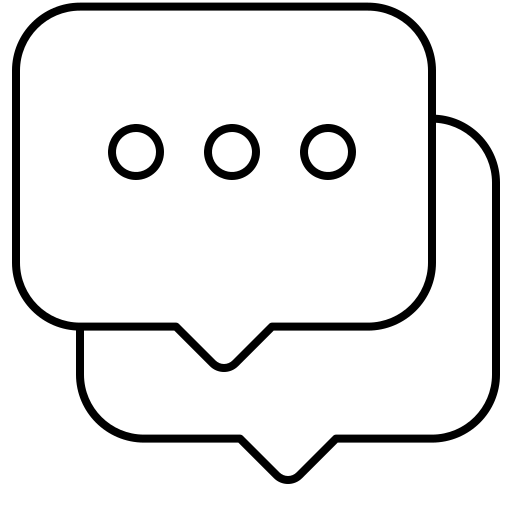In the dynamic world of technology, businesses today are increasingly dependent on the right technical leadership to drive innovation, manage digital transformation, and ensure scalability. However, not all companies need or can afford a full-time Chief Technology Officer (CTO) on their payroll. This is where the choice between hiring a Fractional CTO vs. Full-Time CTO becomes pivotal.
This article dives into the critical differences, advantages, and potential drawbacks of each role, helping you make an informed decision that aligns with your business’s unique needs and growth objectives.
What Is a Fractional CTO?
A Fractional CTO is an experienced technology executive who works part-time or on a contractual basis for a company. Instead of having a full-time commitment, a Fractional CTO provides strategic guidance and technical oversight for a fraction of the time and cost. This role is particularly beneficial for companies that need expert advice without the financial commitment of a full-time hire.
Core Responsibilities of a Fractional CTO:
- Developing a technology roadmap aligned with the company’s goals.
- Overseeing software and system development processes.
- Providing guidance on cybersecurity, infrastructure, and cloud solutions.
- Offering mentorship to in-house development teams.
- Advising on technology vendors and partnerships.
A Fractional CTO typically works with multiple clients simultaneously, offering a diverse range of expertise across industries. This breadth of knowledge can be particularly valuable for businesses looking for cutting-edge solutions and insights from various sectors.
What Is a Full-Time CTO?
A Full-Time CTO is a dedicated technology leader responsible for all aspects of a company’s tech strategy. Full-time CTOs work exclusively for a single company, allowing them to focus on long-term projects, build in-depth knowledge of the company’s processes, and establish a consistent tech culture.
Core Responsibilities of a Full-Time CTO:
- Developing and executing a comprehensive tech strategy for the company.
- Leading internal development teams and managing tech budgets.
- Establishing technology policies and best practices within the organization.
- Ensuring all tech initiatives align with business goals.
- Actively engaging with C-suite executives to shape company direction.
For companies with complex technology needs, rapid growth, or a commitment to building a robust internal team, a Full-Time CTO can provide stability, deep knowledge, and sustained leadership.

Fractional CTO vs. Full-Time CTO: Key Differences
Understanding the differences between these roles can help you decide which option is right for your company. Below, we’ll break down some of the primary distinctions.
1. Commitment Level and Availability
- Fractional CTO: Works on a part-time or project basis, offering limited hours each week. They’re often available on-call but may not be fully accessible for urgent needs.
- Full-Time CTO: Available full-time to address immediate concerns, provide ongoing support, and respond to crises. Ideal for businesses needing round-the-clock guidance.
2. Cost and Budget Considerations
- Fractional CTO: Generally more cost-effective, as companies only pay for the hours they use. It is ideal for startups or smaller firms with limited budgets.
- Full-Time CTO: Higher cost due to salary, benefits, and other employment expenses. Suitable for businesses with the budget to sustain a full-time executive role.
3. Depth of Engagement
- Fractional CTO: Often focuses on specific projects or high-level strategy, making them effective for guiding startups through early tech challenges.
- Full-Time CTO: Engages deeply with all aspects of the company’s tech needs, leading immediate and long-term initiatives. Suitable for companies seeking consistent leadership.
4. Range of Expertise
- Fractional CTO: Brings a diverse, cross-industry perspective, often benefiting businesses looking for broad insights.
- Full-Time CTO: Offers specialized, in-depth knowledge of the company’s technology and can build on a singular vision.
5. Scalability and Growth Potential
- Fractional CTO: Ideal for companies experiencing rapid change that require flexible engagement.
- Full-Time CTO: Essential for companies with a strong growth trajectory and plans to scale their tech operations.
Benefits of Hiring a Fractional CTO
Choosing a Fractional CTO can provide companies with significant advantages, especially when facing budget constraints. Here are some compelling reasons why a Fractional CTO may be the right choice for your business:
- Cost Savings: Fractional CTOs eliminate the need for a full-time salary and benefits, making it a more affordable option.
- Access to Diverse Knowledge: Many Fractional CTOs work across multiple industries, providing fresh perspectives and innovative solutions.
- Flexibility: Companies can scale up or down based on needs, adjusting the number of hours and projects a Fractional CTO handles.
- Faster Hiring Process: Finding a fractional expert is typically faster than recruiting a full-time executive, allowing businesses to respond to challenges more swiftly.
- Project-Based Focus: For businesses that need help with specific projects—like system upgrades, cybersecurity assessments, or strategic planning—a Fractional CTO can deliver targeted expertise without a long-term commitment.
Benefits of Hiring a Full-Time CTO
While a Fractional CTO offers flexibility, a Full-Time CTO provides dedicated leadership, which can be crucial for companies with complex and ongoing tech needs. Here’s why investing in a Full-Time CTO might be the right decision:
- Long-Term Commitment: A Full-Time CTO is deeply invested in the company’s success, aligning tech strategies with broader business goals.
- Team Building and Culture: With a long-term vision, a Full-Time CTO can shape the tech team’s culture, attracting top talent and fostering a cohesive environment.
- In-Depth Knowledge of Systems: A Full-Time CTO develops an intimate understanding of the company’s internal processes and systems, enabling them to address specific challenges efficiently.
- Consistent Availability: Ideal for companies that require constant access to a technology leader, especially for fast-growing or highly regulated industries.
- Alignment with Executive Leadership: Full-Time CTOs often participate in C-suite discussions, shaping the company’s direction from a technology perspective.

Which One Is Right for Your Business? Fractional CTO vs. Full-Time CTO?
Choosing between a Fractional CTO vs. Full-Time CTO largely depends on your company’s current needs, budget, and future vision. Below, we’ll explore three typical business scenarios and suggest the best option.
Scenario 1: Early-Stage Startup
An early-stage startup with a lean budget often needs strategic guidance rather than full-time support. A Fractional CTO could offer valuable expertise to help set up the initial tech structure, recommend tools, and navigate early challenges without straining finances.
Scenario 2: Rapidly Scaling Business
A Full-Time CTO might be a better choice for a company experiencing rapid growth where technological scalability is critical. A dedicated technology leader ensures continuous oversight of tech operations, consistent team management, and alignment with long-term growth objectives.
Scenario 3: Established Enterprise Seeking Innovation
An established enterprise looking to innovate and explore new technological approaches might benefit from a Fractional CTO. They can bring fresh insights, assess new technologies, and recommend innovative solutions that keep the company competitive without altering the core leadership structure.

Key Considerations for Making the Final Decision
When deciding between a Fractional CTO vs. Full-Time CTO, consider these additional factors:
- Budget and Resources: Assess whether your business can afford a full-time salary or if a fractional arrangement makes more financial sense.
- Project Scope: A Fractional CTO might be a more efficient option for companies with specific projects. However, a Full-Time CTO could be better if your tech needs are extensive.
- Company Size and Industry: Larger companies or those in highly regulated industries (e.g., finance, healthcare) might require a Full-Time CTO to handle ongoing compliance and security needs.
- Time Horizon: Having a dedicated CTO in-house can provide stability if you’re planning for significant growth. For short-term or seasonal needs, a fractional role may suffice.
Final Thoughts: Fractional CTO vs. Full-Time CTO—Finding the Right Balance
Deciding between a Fractional CTO vs. Full-Time CTO is a strategic choice that can shape your company’s future. Fractional CTOs offer flexibility and budget-conscious expertise, perfect for startups and growing businesses with short-term needs. On the other hand, Full-Time CTOs bring consistency and deep engagement, which is ideal for companies with complex tech demands and long-term growth plans.
If you’re unsure which option is best for your business, our team at DeljooSoft can help! We provide tailored technology consulting services, offering Fractional CTO services. Contact Us today to learn how we can help your business navigate technology decisions and scale effectively.

